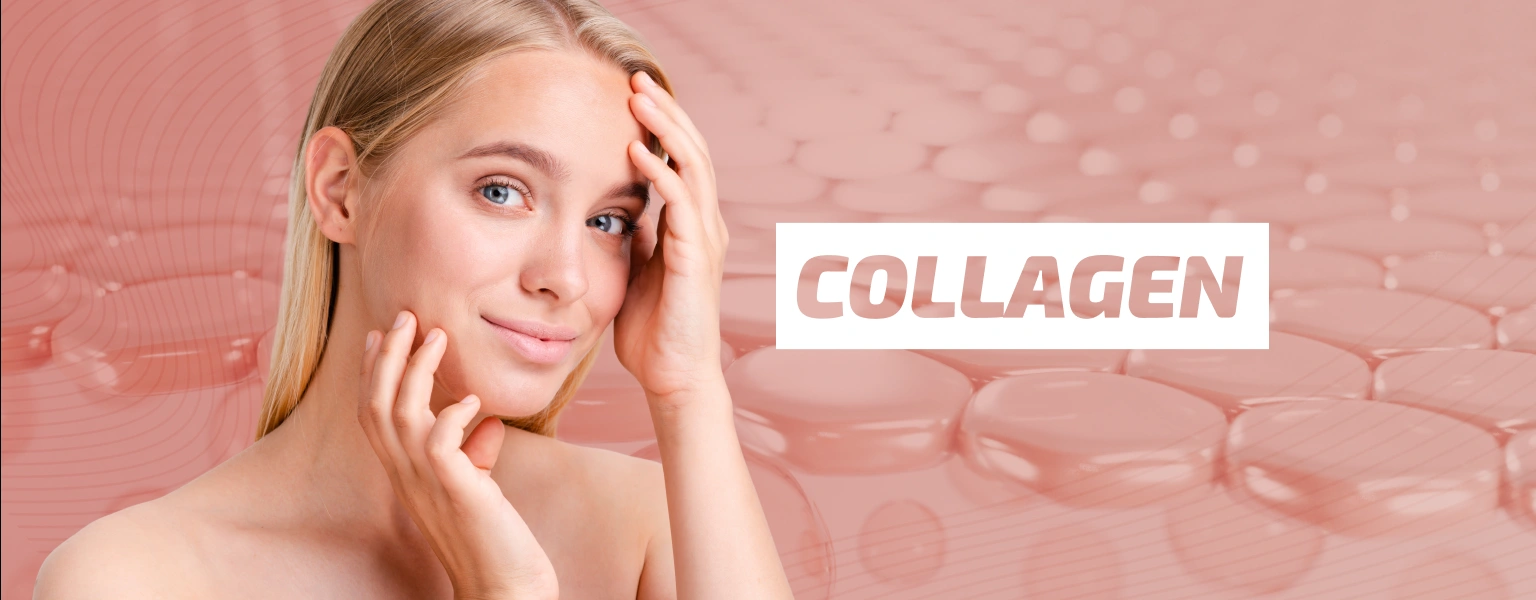Collagen is a natural structural protein that makes up the connective tissue in the human body and makes up a significant portion of the skin, bones, tendons and joints. This extremely important fibrous molecule provides strength, elasticity and resilience to tissues.
Collagen synthesis begins in cells, where the amino acids glycine, proline, and hydroxyproline are combined under the influence of vitamin C and other cofactors. As we age, production decreases, leading to signs of aging and weakening of connective tissue.
The reception of collagen supplements contributes to maintaining skin density, joint health and connective tissue repair without disrupting natural synthesis processes.
Types of collagen in the body
There are different types of collagen in the human body, each of which plays a specific role in maintaining the health and integrity of tissues. These varieties differ in their structure, location, and biological function, and together they form the basis of connective tissue throughout the body.
– Collagen type I is the most abundant type of collagen in the human body. It makes up over 90% of the organic matrix of bones, tendons, skin, and cornea. It provides strength and structural stability.
– Collagen type II – found primarily in cartilage tissue. It is responsible for its elasticity and ability to absorb load, especially in joints.
– Collagen type III – found in soft-structured organs such as the liver, lungs, and blood vessels. It helps with vessel flexibility and tissue healing.
– Collagen type IV makes up the main structure of the basement membrane, which supports and filters cells in the skin and internal organs.
Type V collagen is involved in the formation of cell membranes and the placenta. It plays a key role in regulating the fibrous structure of type I collagen.
Collagen deficiency – symptoms and long-term consequences
Collagen deficiency in the body can be caused by numerous factors, including aging, unbalanced nutrition, low protein and vitamin C intake, excessive exposure to UV rays, smoking, and chronic stress.
As we age, natural collagen synthesis gradually declines, leading to a weakening of connective tissue. Initial symptoms include the appearance of fine lines and wrinkles, loss of skin elasticity, joint pain, brittle nails, and thinning hair.
In the long term, a deficiency in this structural protein can lead to accelerated aging, impaired joint mobility, a higher risk of osteoporosis, and weakening of internal organs due to deteriorated connective tissue.
Types of collagen – choosing supplements
There are various forms of collagen supplements available on the market, each targeted to specific needs of the body. One of the most common options is hydrolyzed collagen, which is an enzymatically digested protein with high digestibility. This form is often used in collagen drink and collagen powder, suitable for both maintaining skin elasticity and strengthening connective tissue.
Among the most effective options for a rejuvenated appearance is pure collagen for the face, which helps smooth wrinkles and improves skin structure from within. For faster action and convenience, liquid collagen is often preferred, which allows direct absorption and a quick effect on the skin and joints.
For people with an active lifestyle or complaints of discomfort when moving, collagen for joints is most suitable, which usually contains type II collagen, which supports cartilage tissue and mobility.
According to the composition
Collagen supplements are also classified according to their origin, with each type bringing specific benefits. Bovine collagen is rich primarily in types I and III, making it particularly suitable for maintaining healthy skin, bones, and muscle mass.
Chicken collagen contains mainly type II and is recommended for joint problems and cartilage tissue repair. There are also products with egg collagen, which includes several types in a natural combination and is characterized by high purity.
Another preferred choice is fish collagen, which has a high biological value and a fine structure, easily absorbed by the body - especially effective for cosmetic needs and skin regeneration.
Collagen for joints
Joint problems such as osteoarthritis, cartilage wear, stiffness, and chronic pain are common, especially with age or intense physical exertion. In such conditions, collagen supplements are used as a means of supporting joint structure and function.
The most commonly used type II collagen is a major component of cartilage and contributes to its elasticity and resilience. Regular intake can reduce inflammation, relieve pain, and improve mobility by nourishing cartilage tissue and stimulating its repair. Collagen for joints is especially effective in people with early signs of joint degeneration or active athletes.
Collagen for hair, skin and nails
Loss of skin elasticity, thinning hair, easy brittle nails and the appearance of fine lines – these are the first signs of reduced collagen synthesis in the body. The causes range from the natural aging processes and unbalanced nutrition to external factors such as UV radiation, smoking, stress and environmental pollution, which accelerate the breakdown of collagen fibers and disrupt normal cell metabolism.
Collagen supplements, especially those with types I and III, support the structure of the dermis, improve moisture retention, and stimulate the production of new cells.
As a result, the skin becomes smoother and firmer, the hair becomes thicker and more resistant to breakage, and the nails become stronger and less brittle. Collagen formulas often additionally include hyaluronic acid, biotin, and vitamins, which enhance the regenerative effect and prolong the visible results.
Vegan collagen – benefits, composition and effects
Vegan collagen is designed specifically for people who do not consume animal products, including vegans, vegetarians, or those with allergies to animal proteins. Unlike traditional collagen supplements, this type of supplement does not contain collagen, but a combination of plant extracts and proteins, vitamins, and amino acids that support the body's natural synthesis.
Their composition most often includes vitamin C, biotin, zinc, silicon, copper and amino acids such as glycine and proline. The advantage of vegan formulas is that they stimulate the body to produce collagen on its own, without the risk of animal impurities. Regular intake can improve skin elasticity, nail strength and hair density, as well as support connective tissue.
A few tips for proper collagen intake
The effectiveness of collagen supplements depends not only on their composition, but also on the way they are taken. To achieve optimal results, it is important to follow established guidelines that promote maximum absorption and long-term benefits:
– Take collagen supplements on an empty stomach or between meals, when the digestive system is most prepared for absorption.
– Combine with vitamin C, which is key for the synthesis of new collagen fibers.
– Avoid sugars and highly processed foods, which accelerate the breakdown of existing collagen in the body.
– Be consistent – visible results appear with regular use for at least 8–12 weeks.
– Tailor the form to your needs – powder, capsules or liquid, depending on how your body responds best.
Key to health, youth and vitality
Collagen is essential for maintaining the structural integrity, elasticity and strength of the skin, joints, bones and connective tissue. With age or adverse external factors, its natural synthesis decreases, leading to visible and functional changes in the body. In this context, collagen supplements become a valuable ally to compensate for the deficiency and stimulate internal production.
When taken properly and combined with active ingredients such as vitamins and minerals, they support recovery processes, improve skin condition, strengthen joints, and have a beneficial effect on overall health and vitality. Browse the MaxLife catalog for quality and effective collagen supplements designed to meet a variety of needs and support the body from the inside out.


 0878 567 491
0878 567 491






